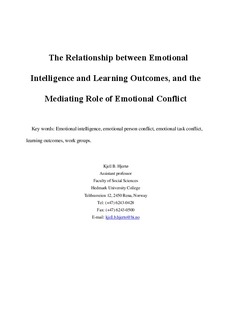The relationship between emotional intelligence and learning outcomes, and the mediating role of emotional conflict
Conference object
Permanent lenke
http://hdl.handle.net/11250/134765Utgivelsesdato
2010-03-25Metadata
Vis full innførselSammendrag
A field sample of 1100 employees in the army was investigated to study the relationship between
the individuals’ self reported emotional intelligence and learning outcomes in work groups, with
two dimensions of emotional conflict as mediators, emotional person conflict and emotional task
conflict. Most importantly, emotional intelligence predicted positively learning outcomes and
emotional task conflict, and predicted negatively emotional person conflict. Further, emotional task
conflict predicted learning outcomes positively, whereas emotional person conflict predicted
learning outcome negatively. Particularly, the ability of regulation own emotions accounted for the
negative relationship between emotional intelligence and emotional person conflict, and the ability
of self emotion appraisal accounted for the positive relationship between emotional intelligence and
emotional task conflict. However, the mediating effect of emotional conflict was weak, as the
relationship between emotional intelligence and learning outcomes remained strongly significant
also after the two emotional conflict dimensions were added to the model. Implications for theory
and research, and directions for future research are discussed.
